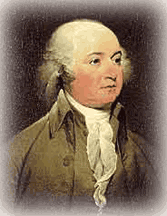John Adams was the second president of the United States, a distinguished lawyer and writer, a seasoned but largely unsuccessful diplomat and the founder of one of the most distinguished families in American history. John Adams was born in Braintree (present day Quincy), Massachusetts, the son of a respected farmer. He graduated from Harvard College in 1755, and taught for a year before studying the law. He rose rapidly as a talented lawyer and began to make his mark politically during the Stamp Act Crisis, when he joined forces with his distant cousin Samuel Adams in resisting British taxation schemes.
John Adams was not a great orator, but his writings were noted for their unusual force and clarity. In 1770, he incurred the wrath of patriot forces by providing legal defense for the British soldiers who were charged with murder in the Boston Massacre.
John Adams was a delegate to both Continental Congresses and served on the drafting committee for the Declaration of Independence. It was Adams the Northerner who proposed that the Southerner George Washington be given command of the Continental Army.
Adams favored the idea that only those with wealth and property should govern affairs in America, leading him to become one of the founders of the later Federalist Party. In May, 1776, he expressed his views on the right to vote in a letter to James Sullivan, a member of the provincial congress of Massachusetts:
John Adams was born in Braintree (present day Quincy), Massachusetts, the son of a respected farmer. He graduated from Harvard College in 1755, and taught for a year before studying the law. He rose rapidly as a talented lawyer and began to make his mark politically during the Stamp Act Crisis, when he joined forces with his distant cousin Samuel Adams in resisting British taxation schemes.
John Adams was not a great orator, but his writings were noted for their unusual force and clarity. In 1770, he incurred the wrath of patriot forces by providing legal defense for the British soldiers who were charged with murder in the Boston Massacre.
John Adams was a delegate to both Continental Congresses and served on the drafting committee for the Declaration of Independence. It was Adams the Northerner who proposed that the Southerner George Washington be given command of the Continental Army.
Adams favored the idea that only those with wealth and property should govern affairs in America, leading him to become one of the founders of the later Federalist Party. In May, 1776, he expressed his views on the right to vote in a letter to James Sullivan, a member of the provincial congress of Massachusetts:
Is it not equally true, that men in general in every society, who are wholly destitute of property, are also too little acquainted with public affairs to form a right judgment, and too dependent upon other men to have a will of their own? If this is a fact, if you give to every man, who has no property, a vote, will you not make a fine encouraging provision for corruption by your fundamental law? Such is the frailty of the human heart, that very few men, who have no property, have any judgment of their own. They talk and vote as they are directed by some man of property, who has attached their minds to his interest.In 1778, John Adams began the first in a series of diplomatic missions, serving the Articles of Confederation government as minister to France. In following years he joined Benjamin Franklin and John Jay in the peace process which sought an end to the War for Independence; clearly the affable Franklin was a superior diplomat to the prickly Adams. In 1785, Adams was appointed by the newly independent United States as minister to the former mother country; the mission did not go well and Adams failed to secure a highly prized commercial treaty. Adams quickly came to the conclusion that the fundamental problem was that American commercial treaties could not be negotiated with a national government operating under the Articles of Confederation. He expressed himself in a letter to John Jay on May 8,1785:
It is very possible that the Cabinet of St James’s may decline, even entering into any conferences at all, upon the Subject of a Treaty of Commerce, untill the Powers of Congress are enlarged. if they Should the People of America cannot be too soon informed of it, and turn the deliberations in their assemblies to this Object.In 1789, John Adams began serving Washington as vice president, a position he described as the "most insignificant office." Adams emerged as a leader of the Federalist faction, opposing the policies of Thomas Jefferson and his supporters. Despite many common political interests, Adams and Alexander Hamilton clashed repeatedly. In 1796, John Adams was elected president, but his chief opponent, Jefferson, was made vice president, thanks to Hamilton's maneuvering. Adams' single term was marked by a series of crises: the XYZ Affair, cabinet intrigue, continuing tension with Hamilton, the Alien and Sedition Acts controversy and problems associated with Adams' often difficult personality. The Adams family was the first to occupy the new presidential residence in Washington, D.C. Jefferson managed to wrest the presidency from John Adams in 1800, which led to the latter's retirement from public life. He spent his remaining 25 years writing political essays and maintaining a voluminous correspondence. In his retirement, Adams lost much of the bitterness that had plagued his presidency and regained much of the public's admiration. In 1812, Adams and Jefferson were reconciled and generated a steady stream of letters for the rest of their lives. As John Adams lay on his death bed, his last words were, "Jefferson still lives." He was wrong; Jefferson had died a few hours earlier. Both men died on July 4, 1826, the 50th anniversary of the Declaration of Independence.